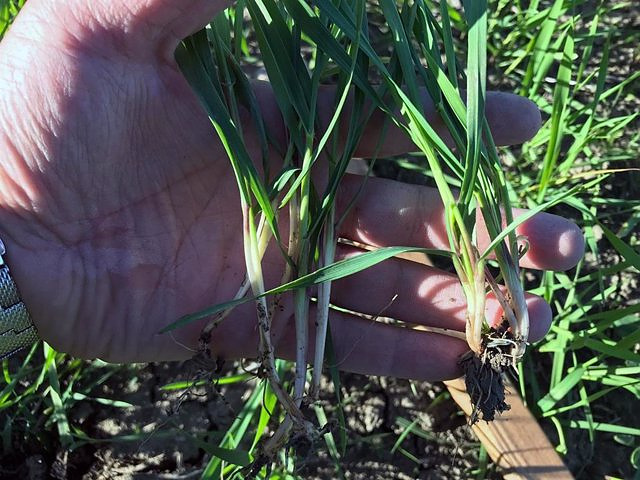VALENCIA, 25 Apr. (EUROPA PRESS) -
Accelerate the agroecological transition in the Mediterranean region with innovative proposals that make it possible to generate new sustainable production systems for basic foods, such as cereals, in the face of current and future climate change scenarios.
This is the main objective of the European AgrEcoMed project, in which research staff from the Higher Technical School of Agricultural Engineering and the Natural Environment (Etsiamn) of the Universitat Politècnica de València (UPV) -- Neus Sanjuan, Héctor Moreno and Gabriela Clemente participate. --, together with Javier Ribal, from the Economic Engineering Research Center and professor at the Faculty of Business Administration and Management.
The study -explains the academic institution in a statement- starts from the reality that the scientific community plays an important role in the development of the European Green Pact, especially the "Farm to Fork" strategy, which constitutes an essential element for increase the sustainability of the European agri-food system through a series of environmental and social objectives.
In fact, the proposal on the common agricultural policy (CAP) for the period 2021-27 includes as fundamental axes of action: the agroecological transition, the economic and social development of rural areas and the competitiveness of farms.
For this reason, Neus Sanjuan, a researcher at the University Institute of Food Engineering for Development and main researcher at the UPV in the project, highlights that the agroecological approach has a strong territorial connotation that "transcends beyond the ecological and agronomic and also includes the social, economic and cultural dimension.Specifically, at the UPV we will carry out the evaluation of the environmental and economic sustainability of agroecological proposals compared to conventional cultivation, based on field trials of crop rotations in southern Italy and Tunisia that will include, among other crops, recovered wheat varieties", explains the Valencian researcher.
The project --which belongs to the PRIMA call financed with funds from the European H2020 program-- seeks Mediterranean farmers and producers to develop sustainable crop systems through innovative practices and technologies.
"During the 36 months of the project, we are going to investigate the sustainability of innovative proposals that take into account local agri-environmental needs, the socioeconomic and territorial context, the demands of the end user and the needs of the relevant agents in the supply chain. local supply," says Gabriela Clemente, also a researcher at the University Institute of Food Engineering for Development at the UPV.
All this will be articulated through an agroecological approach based "on the efficient use of natural resources, the reduction of pollution, the promotion of the circular economy and the idiosyncrasy of each region", asserts Héctor Moreno, a researcher at the Valencian Center. of Studies on Irrigation of the UPV.
Finally, the focus will also be on developing awareness campaigns that promote "sustainable food consumption, and a circular economy for the transition towards more sustainable agri-food chains," says Javier Ribal.
The AgrEcoMed initiative is coordinated by the Università della Basilicata (UNIBAS) and is part of a consortium made up of the UPV itself, the Università degli Studi di Bari (UNIBA), the Consiglio per la Ricerca e l'Economia Agraria (CREA), the Center for Biotechnology of Sfax (CBS), the University Sultan Moulay Slimane Beni Mellal (USMS), the National School of Agriculture (ENAM) and the University of Córdoba (UCO).

 Exploring Cardano: Inner Workings and Advantages of this Cryptocurrency
Exploring Cardano: Inner Workings and Advantages of this Cryptocurrency Seville.- Economy.- Innova.- STSA inaugurates its new painting and sealing hangar in San Pablo, for 18 million
Seville.- Economy.- Innova.- STSA inaugurates its new painting and sealing hangar in San Pablo, for 18 million Innova.- More than 300 volunteers join the Andalucía Compromiso Digital network in one month to facilitate access to ICT
Innova.- More than 300 volunteers join the Andalucía Compromiso Digital network in one month to facilitate access to ICT Innova.-AMP.- Ayesa acquires 51% of Sadiel, which will create new technological engineering products and expand markets
Innova.-AMP.- Ayesa acquires 51% of Sadiel, which will create new technological engineering products and expand markets Khan is re-elected mayor of London and underpins Labor's victory in local elections
Khan is re-elected mayor of London and underpins Labor's victory in local elections Felipe VI swears the flag again 40 years later at the AGM with Princess Leonor as a witness
Felipe VI swears the flag again 40 years later at the AGM with Princess Leonor as a witness Freixenet and unions agree to reduce working hours by 20-50% this year due to the drought
Freixenet and unions agree to reduce working hours by 20-50% this year due to the drought STATEMENT: Nearly 400 people participate in the II Family Support Conference at UIC Barcelona
STATEMENT: Nearly 400 people participate in the II Family Support Conference at UIC Barcelona How Blockchain in being used to shape the future
How Blockchain in being used to shape the future Not just BTC and ETH: Here Are Some More Interesting Coins Worth Focusing on
Not just BTC and ETH: Here Are Some More Interesting Coins Worth Focusing on A sensor system obtains the fingerprint of essential oils and detects if they have been adulterated
A sensor system obtains the fingerprint of essential oils and detects if they have been adulterated Faraday UPV presents the 'Origin' rocket to exceed 10 km of flight: "It is the beginning of the journey to space"
Faraday UPV presents the 'Origin' rocket to exceed 10 km of flight: "It is the beginning of the journey to space" The Generalitat calls for aid worth 4 million to promote innovation projects in municipalities
The Generalitat calls for aid worth 4 million to promote innovation projects in municipalities UPV students design an app that helps improve the ventilation of homes in the face of high temperatures
UPV students design an app that helps improve the ventilation of homes in the face of high temperatures A million people demonstrate in France against Macron's pension reform
A million people demonstrate in France against Macron's pension reform Russia launches several missiles against "critical infrastructure" in the city of Zaporizhia
Russia launches several missiles against "critical infrastructure" in the city of Zaporizhia A "procession" remembers the dead of the Calabria shipwreck as bodies continue to wash up on the shore
A "procession" remembers the dead of the Calabria shipwreck as bodies continue to wash up on the shore Prison sentences handed down for three prominent Hong Kong pro-democracy activists
Prison sentences handed down for three prominent Hong Kong pro-democracy activists ETH continues to leave trading platforms, Ethereum balance on exchanges lowest in 3 years
ETH continues to leave trading platforms, Ethereum balance on exchanges lowest in 3 years Investors invest $450 million in Consensys, Ethereum incubator now valued at $7 billion
Investors invest $450 million in Consensys, Ethereum incubator now valued at $7 billion Alchemy Integrates Ethereum L2 Product Starknet to Enhance Web3 Scalability at a Price 100x Lower Than L1 Fees
Alchemy Integrates Ethereum L2 Product Starknet to Enhance Web3 Scalability at a Price 100x Lower Than L1 Fees Mining Report: Bitcoin's Electricity Consumption Declines by 25% in Q1 2022
Mining Report: Bitcoin's Electricity Consumption Declines by 25% in Q1 2022 Oil-to-Bitcoin Mining Firm Crusoe Energy Systems Raised $505 Million
Oil-to-Bitcoin Mining Firm Crusoe Energy Systems Raised $505 Million Microbt reveals the latest Bitcoin mining rigs -- Machines produce up to 126 TH/s with custom 5nm chip design
Microbt reveals the latest Bitcoin mining rigs -- Machines produce up to 126 TH/s with custom 5nm chip design Bitcoin's Mining Difficulty Hits a Lifetime High, With More Than 90% of BTC Supply Issued
Bitcoin's Mining Difficulty Hits a Lifetime High, With More Than 90% of BTC Supply Issued The Biggest Movers are Near, EOS, and RUNE during Friday's Selloff
The Biggest Movers are Near, EOS, and RUNE during Friday's Selloff Global Markets Spooked by a Hawkish Fed and Covid, Stocks and Crypto Gain After Musk Buys Twitter
Global Markets Spooked by a Hawkish Fed and Covid, Stocks and Crypto Gain After Musk Buys Twitter Bitso to offset carbon emissions from the Trading Platform's ERC20, ETH, and BTC Transactions
Bitso to offset carbon emissions from the Trading Platform's ERC20, ETH, and BTC Transactions Draftkings Announces 2022 College Hoops NFT Selection for March Madness
Draftkings Announces 2022 College Hoops NFT Selection for March Madness
























